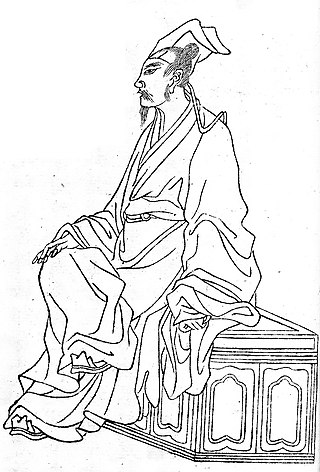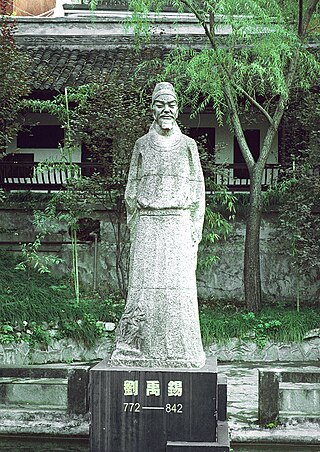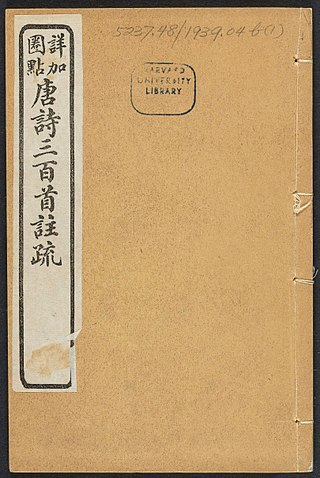Pei Di | |
|---|---|
| Native name | 裴迪 |
| Born | 714 |
| Occupation | Poet |
| Nationality | Chinese |
| Notable works | "A Farewell to Cui", The Wang River Collection |
Pei Di (Chinese : 裴迪; pinyin : Péi Dí; Wade–Giles : P'ei Ti) was a Chinese poet of the Tang dynasty, approximate year of birth 714, with twenty preserved poems in the Wangchuan ji poetry collection and one work included in the popular Three Hundred Tang Poems . Pei Di was a contemporary of Wang Wei, although younger by fifteen years. [1] The Wangchuan ji poetry collaboration between Pei Di and Wang Wei collects twenty matching poems by Wang Wei and Pei Di. The name is also rendered into English as "P'ei Ti" or "Pei Shidi" (shi = 十). The close personal friendship between Wang Wei and Pei Di is preserved in a letter by Wang Wei inviting Pei for a Springtime visit together at Wang's country estate. This letter has been translated by Arthur Waley. [2] Pei also had a poetic relationship with Du Fu. [3] Other than through Pei Di's few surviving poems, and the poems addressed to him by Wang Wei and Du Fu, "pitifully little" [4] is known about Pei Di, other than that he had a reasonably successful government career. [5] According to one source, Pei Di: saved Wang’s life by smuggling one of his poems out of prison—proof he was being held by the rebels against his will. The two were separated at last when Pei Di was made governor of Szechuan, then a wild, remote place, reachable only by treacherous plank paths hung from the sides of cliffs." [6]
One of Pei Di's poems has been translated by Witter Bynner as "A Farewell to Cui", [7] a farewell poem dedicated to a friend named Cui, was included in the important collection Three Hundred Tang Poems , as exemplary of the five-character (line length) version of the quatrain style known as juéjù, or "cut verse". Pei Di is also famous for his collaboration with Wang Wei: this series of poems (the Wangchuan ji ) has been translated into English as "The Wang River Collection", [8] or similarly. Consisting of twenty preserved titles, for each title Wang Wei wrote a pair of couplets loosely inspired by landscape features around his country estate. These were then matched by a pair of couplets on the same theme by Pei Di. [9] These and a few other poems by Pei Di are preserved in Scroll 129 [10] of the Quantangshi .
A letter from Wang Wei to his friend Pei Di (here transliterated P'ei Ti) is preserved, and has been translated by Arthur Waley:
PROSE LETTER
_To the Bachelor-of-Arts P`ei Ti_
Of late during the sacrificial month, the weather has been calm and clear, and I might easily have crossed the mountain. But I knew that you were conning the classics and did not dare disturb you. So I roamed about the mountain-side, rested at the Kan-p`ei Temple, dined with the mountain priests, and, after dinner, came home again. Going northwards, I crossed the Yuuan-pa, over whose waters the unclouded moon shone with dazzling rim. When night was far advanced, I mounted Hua-tzuu's Hill and saw the moonlight tossed up and thrown down by the jostling waves of Wang River. On the wintry mountain distant lights twinkled and vanished; in some deep lane beyond the forest a dog barked at the cold, with a cry as fierce as a wolf's. The sound of villagers grinding their corn at night filled the gaps between the slow chiming of a distant bell.
Now I am sitting alone. I listen, but cannot hear my grooms and servants move or speak. I think much of old days: how hand in hand, composing poems as we went, we walked down twisting paths to the banks of clear streams.
We must wait for Spring to come: till the grasses sprout and the trees bloom. Then wandering together in the spring hills we shall see the trout leap lightly from the stream, the white gulls stretch their wings, the dew fall on the green moss. And in the morning we shall hear the cry of curlews in the barley-fields.
It is not long to wait. Shall you be with me then? Did I not know the natural subtlety of your intelligence, I would not dare address to you so remote an invitation. You will understand that a deep feeling dictates this course.
Written without disrespect by Wang Wei, a dweller in the mountains. [11]
Pei Di's influence on posterity mainly derives from his contributions to the Wangchuan Ji anthology, consisting of 20 of his poems written as responsive matches to 20 of Wang Wei's. The series has inspired various subsequent works, including translations into English by Jerome Ch'en and Michael Bullock [12] and by H. C. Chang. [13] Also, many centuries later, Witter Bynner translated the one Pei Di poem included in the Three Hundred Tang Poems (229) as "Pei Di A FAREWELL TO CUI" , a poem which thus remains historically as one of the more reprinted poems. As this poem appears in Bynner's Three Hundred Tang Poems:
送崔九
歸山深淺去, 須盡丘壑美。
莫學武陵人, 暫遊桃源裡。
A FAREWELL TO CUI
Though you think to return to this maze of mountains,
Oh, let them brim your heart with wonder!....
Remember the fisherman from Wuling
Who had only a day in the Peach-Blossom Country.
Poetic Note: The final two lines of this poem are a reference to The Peach Blossom Spring by Tao Yuanming (also known as Tao Qian).
In the same Three Hundred Tang Poems (115), a poem by Wang Wei addressed to Pei Di is also included, again with the Witter Bynner translation:
五言律詩 王維 輞川閑居贈 裴秀才迪
寒山轉蒼翠, 秋水日潺湲。
倚杖柴門外, 臨風聽暮蟬。
渡頭餘落日, 墟里上孤煙。
復值接輿醉, 狂歌五柳前。
Wang Wei A MESSAGE FROM MY LODGE AT WANGCHUAN
TO PEI DI
The mountains are cold and blue now
And the autumn waters have run all day.
By my thatch door, leaning on my staff,
I listen to cicadas in the evening wind.
Sunset lingers at the ferry,
Supper-smoke floats up from the houses.
...Oh, when shall I pledge the great Hermit again
And sing a wild poem at Five Willows?
Bibliographic note: Wang Wei's reference to Pei Di as xiùcai (秀才) has a strong implication of Pei Di's having passed a county level examination in the imperial examination system.
Poetic notes: In the penultimate line, Wang Wei obliquely refers to Pei (who was also in government service) as 接輿 Jiēyú (also Chieh-yu or "great Hermit or Lu Tong 陸通). This is in reference to an account that Jieyu of Chu (and a famed drinker and somewhat of a recluse) stopped the chariot of Confucius and warned him with a song [14]
O phoenix, O phoenix,
Virtue is corrupted....
Come away! Come away!
Politics are dangerous!
In the last line, Wang expresses the desire to be drinking with Pei at Five Willows. Five Willows is an allusion to Tao Qian, another poet famous for drinking and eventually seeking some level of seclusion after encountering danger as part of a political career. [15]

Wang Wei was a Chinese musician, painter, poet, and politician of the middle Tang dynasty. He is regarded as one of the most distinguished men of arts and letters of his era. About 400 of his poems survived and 29 of them are included in the 18th-century anthology Three Hundred Tang Poems. A large portion of his finest poems drew inspirations from the local landscape.

Chinese poetry is poetry written, spoken, or chanted in the Chinese language, and a part of the Chinese literature. While this last term comprises Classical Chinese, Standard Chinese, Mandarin Chinese, Yue Chinese, and other historical and vernacular forms of the language, its poetry generally falls into one of two primary types, Classical Chinese poetry and Modern Chinese poetry.

Bai Juyi, courtesy name Letian (樂天), was a Chinese musician, poet, and politician during the Tang dynasty. Many of his poems concern his career or observations made about everyday life, including as governor of three different provinces. He achieved fame as a writer of verse in a low-key, near vernacular style that was popular throughout medieval East Asia.

Meng Haoran was a Chinese poet and a major literary figure of the Tang dynasty. He was somewhat an older contemporary of Wang Wei, Li Bai and Du Fu. Despite his brief pursuit of an official career, Meng Haoran spent most of his life in and around his hometown Xiangyang of the Hubei Province living like a hermit, while creating poems inspired by its landscapes and milieu.

Xie Lingyun and also known as the Duke of Kangle (康樂公) was one of the foremost Chinese poets towards the end of the Southern and Northern Dynasties and continued in poetic fame through the beginning of the Six Dynasties, so Xie is also considered to be part of the Six Dynasties poetry era.
Cui Hao was a Chinese poet of the Tang dynasty in China and considered a main early exponent of the regulated verse form of Classical Chinese poetry.

Yuan Zhen, courtesy name Weizhi (微之), was a Chinese novelist, poet, and politician of the middle Tang dynasty. In prose literature, Yuan Zhen is particularly known for his work Yingying's Biography, which has often been adapted for other treatments, including operatic and musical ones. In poetry, he is remembered for the inclusion of some of his poems by popular anthologies, his verses on exotic topics, and for being part of the group of "New Yuefu" poets, which often used poetry as a form of expression and protest, but one potentially subtle enough to avoid the likely repercussions of more direct criticism. The poetic circle in which Yuan Zhen was involved included Bai Juyi, among others. Politically Yuan Zhen was briefly chancellor, during the reign of Emperor Muzong.

Liu Yuxi was a Chinese essayist, philosopher, and poet active during the Tang dynasty.

Zhang Ji, courtesy name Yisun (懿孙), was a Chinese poet born in Xiangyang during the Tang dynasty.

The Three Hundred Tang Poems is an anthology of poems from the Chinese Tang dynasty (618–907). It was first compiled around 1763 by Sun Zhu (1722–1778), who was a Qing Dynasty scholar and was also known as Hengtang Tuishi. Various later editions also exist. All editions contain slightly more than 300 total poems. The number 300 was a classic number for a poetry collection due to the influence of the Classic of Poetry, which was generally known as The Three Hundred Poems.

Tang poetry refers to poetry written in or around the time of or in the characteristic style of China's Tang dynasty, and/or follows a certain style, often considered as the Golden Age of Chinese poetry. The Complete Tang Poems includes over 48,900 poems written by over 2,200 authors. During the Tang dynasty, poetry continued to be an important part of social life at all levels of society. Scholars were required to master poetry for the civil service exams, but the art was theoretically available to everyone. This led to a large record of poetry and poets, a partial record of which survives today. The two most famous poets of the period were Li Bai and Du Fu. The Qing dynasty selection, Three Hundred Tang Poems, has made Tang poetry familiar to educated Chinese in modern times.
Chang Jian, and whose name, especially in older English transliteration, appears as "Ch'ang Chien", was a poet of the Tang dynasty, and two of whose poems were collected in the popular anthology Three Hundred Tang Poems.
Wei Yingwu , courtesy name Yibo (義博), art name Xizhai (西齋), was a Chinese poet of the Tang dynasty. Twelve of Wei Yingwu's poems were included in the influential Three Hundred Tang Poems anthology. He was also known by his honorific name Wei Suzhou (韋蘇州), which was bestowed upon him as a result of his service as the governor of Suzhou.
Qian Qi was a Chinese poet of the Tang dynasty. Three of his poems have been included within the famous anthology Three Hundred Tang Poems. His courtesy name was Zhongwen.
Qiu Wei (traditional Chinese: 邱為; simplified Chinese: 邱为; pinyin: Qiū Wéi, 694–789? was a Chinese poet during the Tang dynasty, with one of his poems being included in the famous anthology Three Hundred Tang Poems.

The Wangchuan ji is a collection of Tang poetry written by the two poets Wang Wei and Pei Di, also known by other names, such as the Wheel River Collection. Wang Wei had acquired a retirement location away from the busy capitol city, in what is now Lantian County, in China. The verses are based on a series of twenty scenes, inspired in part by the sights available at Wang Wei's retirement estate and in part by imaginary allusion: each one forms the topic for a pair of one five-character quatrains, one by each of the poetic pair. Besides the long-term interest in these verses in China, this anthology has created much interest around the world, including numerous translations, especially Wang's version of what has been translated as "Deer Park", among other versions of the title. Several complete translations of the whole work have been done, in English. A series of "Twenty Scenes" of Wangchuan were done as a painting series. The Wangchuan poems form an important part of traditional Chinese Shan shui landscape painting and Shanshui poetry development. There are clear indications of the influence of the Six Dynasties poet early exemplar of landscape genre poetry Xie Lingyun's poems on topics, partly inspired by his family estate, in what is today Zhejiang. The considerable influence of Pei Di and Wang Wei's Wangchuan ji shows in much subsequent painting, music, and poetry.

Simians of various sorts are an important motif in Chinese poetry. Examples of simian imagery have an important place in Chinese poetry ranging from the Chu Ci poets through poets such as Li Bai, Wang Wei, Du Fu, and more. Various poetic concepts could be communicated by the inclusion of simian imagery in a poem, and the use of simian allusions can help provide key insights into the poems. The use of simians in Chinese poetry is part of a broader appearance of macaques and other monkeys in Chinese culture as well as the monkey-like gibbons and sometimes monkey-like creatures from Chinese mythology.

Nineteen Ways of Looking at Wang Wei: How a Chinese Poem Is Translated is a 1987 study by the American author Eliot Weinberger, with an addendum written by the Mexican poet Octavio Paz. The work analyzes 19 renditions of the Chinese-language nature poem "Deer Grove", which was originally written by the Tang-era poet Wang Wei (699–759). Weinberger compares translations of the poem into English, French, and Spanish, and analyzes the difficulties that are encountered when translating Chinese poetry. Since its publication, the book has been referred to as an essential work on the subject of translation. An updated edition including additional "ways" was published in 2016.